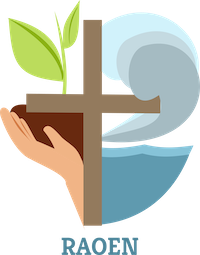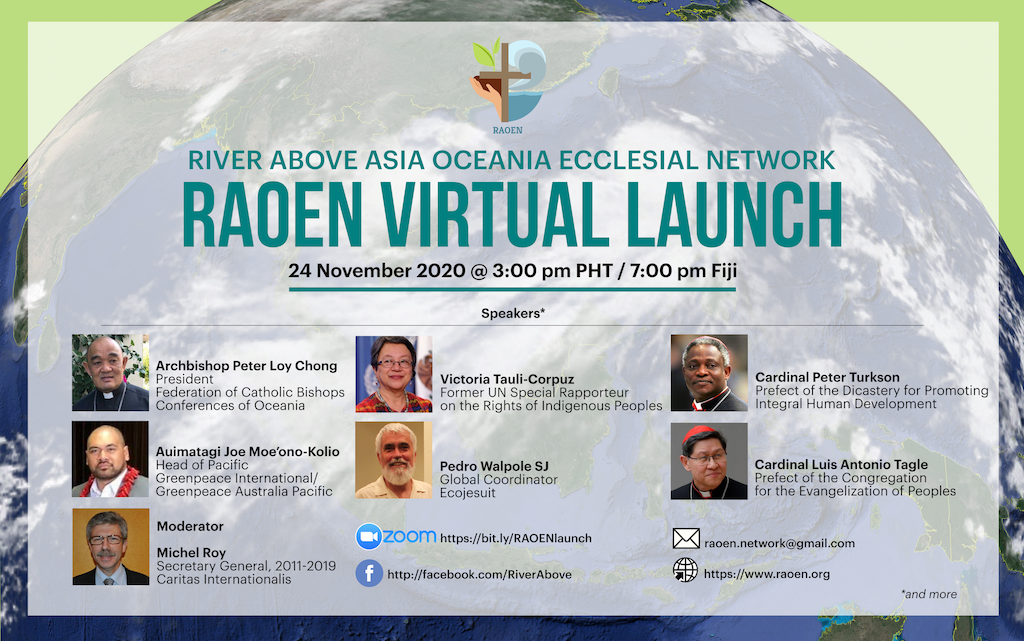Towards a Church dialogue and collaboration for forests, oceans, and peoples of Asia and Oceania: The RAOEN launch
Seeking to engage the Church and the peoples of Asia and Oceania to explore pathways for deeper dialogue and broader interfaith collaboration for forests, oceans, and peoples in the region, the River above Asia and Oceania Ecclesial Network (RAOEN) was launched online on 24 November.
RAOEN for forests, oceans, and peoples
The Pacific, one-third of the planet’s surface, is the largest climate determinant on Earth. Asia and Oceania share a common image in the River Above – the Pacific Ocean – which is the life, the river of Asia feeding all rivers, seasons and lives. The surface area and ocean currents absorb energy and generate thermals and other air flows, forming the weather patterns and events while sustaining their movement westward. This flow is life-giving and life-taking, especially as the climate is changing and resources are being exhausted. The welfare of the lands and peoples is bound to the welfare of the seas.
With this context, Pedro Walpole SJ, Ecojesuit Global Coordinator and key animator and network catalyst of the RAOEN initiative provided an orientation and the next steps for the new network.
The social and ecological disharmony is an indication of the sign of the times and there is a call for solidarity through dialogue and discernment to share a vision for caring, inspire hope, and commit to respond to the problems in the margins.
The biomes of Asia and Oceania comprise integral landscapes and seascapes that highlight the interconnectedness of life. Anthropocentrism, or “the belief that value is human-centred and that all other beings are means to human ends,” (from Anthropocentrism: More than Just a Misunderstood Problem by Helen Kopnina, Haydn Washington, and John J Piccolo) has compromised the integrity of the biomes and disrupted the balance of its ecological systems.
The increasing concentration of carbon dioxide in the atmosphere resulting in ocean acidification detrimentally affects biological and physiological processes of marine ecosystems. Moreover, forests are being denuded, ambient air quality is deteriorating, and water bodies are becoming polluted. With rampant environmental degradation, the quality of human life is also adversely affected as cultures and communities dissipate as a result.
As such, issues persist in the margins and there is an urgent call for accountability to be drawn towards the global desires for the common good and the Common Home by moving forward the transition from an extractive economy to a circular economy. By doing so, growth is fostered as the connectivity of one’s choices is recognized.
The principles of Laudato Si’ also emphasize the need to live in harmony with natural systems that sustain balance and diversity by upholding cultural integrity and indigenous relations with the land and sea. This highlights the role of local churches in providing a voice for local concerns as they are called to engage themselves in the culture of communities for effective proclamation and practice in each sociocultural area.
Given an ecosystem context, the Church’s response is integral with Creation. As an ecclesial network, interfaith collaboration enables the exploration of opportunities for broader ecclesial services by engaging with neighboring communities in the regions. Through coordination, the development and mainstreaming of a framework for promoting integral ecology are sought and forming an intergeneration ecclesial network is possible through a transparent process of collaboration.
Through a territorial biomes approach, RAOEN seeks to sustain dialogue and collaborative engagements across the Church, indigenous communities, youth groups, and other organizations and institutions, to work towards an understanding on what is possible in caring for the oceans, land, and people by listening to cultural wisdom.
Listening and discernment shape the emerging process of collaboration as stories, experiences, and practices from the ground are shared and responsibilities are built. Such engagements will bear fruit through the development of case studies that capture stories of struggles and hope.
RAOEN also seeks to broaden and strengthen linkages in developing an atlas to highlight and celebrate the interconnectedness of biodiversity and culture. With RAOEN as a platform, collaborators are invited to share news, events, and stories to impart the message of hope as small stories create bigger realities. There are many challenges but RAOEN seeks to move forward with hope and share the gift of the spirit in unity, wherein strength is given to those taking action, and an ecclesial identity is humbly acknowledged.
Expectations for RAOEN from indigenous leaders in Asia and Oceania
Victoria Tauli-Corpuz, former UN Special Rapporteur on the Rights of Indigenous Peoples and an indigenous leader from Asia, emphasized the critical role of indigenous communities in managing the resources in the biomes they relate with and the need to empower them as they uphold their rights to their ancestral domains. From Oceania, Auimatagi Joseph Sapati Moeono-Kolio, head of Greenpeace Pacific, was unable to join but shared his reflections on the network launch through a brief video message. He hopes that RAOEN will be able to “foster a greater sense of moral obligation, provide a practical application of faith, and encourage parishioners that the Church doesn’t end when the parish doors close on Sundays but actually flows out to the world on Monday.” The voices of the Pacific through its communities of faith, youth, and indigenous are looking for solutions, and they “cannot sail in opposite directions.” The integrated sense of nature and environmental stewardship that is shared by indigenous communities is also what is in the Church and its teachings on the need for fraternity and solidarity.
Stories from the ground: Caring for the environment and people
Community representatives from Oceania and Asia shared their stories and reflections of hope and action and their expectations of RAOEN in deepening commitments and broadening solidarity.
Sister Makareta from the Whanganui-Māori Tribe in the Manawatū-Whanganu region of New Zealand shared the environmental concerns in the Whanganui river and its surrounding areas. The degradation of water quality due to effluent disposal, the agricultural and industrial activities, and the clearing of vast tracts of land, are destroying the traditional fishing methods of the Māori tribe. Emphasizing the significance of the river and land to the culture, Sister Makareta shared how the Māori draws from their culture in strengthening their values and duties in caring for their land and sustaining life, as embodied in the saying Ko au te Awa, ko te Awa ko Au which translates to “I am the river, and the river is me.”
Yeni Kristanti shared her stories on working with the Asmat people of Sawa Erma in West Papua and how the Sawa Erma parish accompanied the community amid the COVID-19 pandemic. At the onset, the community in Sawa Erma expressed their concerns given their vulnerability to the coronavirus transmission. Despite quarantine measures, there is an alarming lack of information dissemination on the virus out of fear of public unrest; thus, health protocols are not enforced. Recognizing the community’s vulnerabilities, the Sawa Erma parish recruited resource persons to educate the community. The people of Sawa Erma then sought refuge in temporary shelters in the forests as a means of mitigating virus transmission. Through outreach teams organized by the parish, food and medicine were regularly provided to those in temporary shelters where they are also regularly informed and updated on the pandemic.
Rosalyn, Country Director of Jesuit Refugee Service-Myanmar, shared the initiatives of the people in Kayah State to care for the people and the environment. Despite the community’s efforts in caring for the environment, solid wastes continue to end up in water bodies and worsened by the pandemic due to improper disposal of face masks and personal protective equipment. The community mobilized to conduct clean-up drives and developed local action plans. Moreover, the community promoted home gardening to ensure food security amid the pandemic. Rosalyn emphasized the need to go beyond awareness by enforcing policies and encouraging collective responsibility, reiterating the significance of RAOEN as a platform for sharing best practices and local stories.
Lastly, Somnuek Sriphornphunsawat from the Emmaus Center in Chiang Mai, Thailand, shared the experiences and practices of local communities in northern Thailand in caring for the forests and people. Through the practice of “forest ordination,” trees are deemed as sacred and people are prohibited from cutting and destroying ordinated trees. He also shared that engaging in networking through forest ordination activities enables people from different faith and cultural backgrounds to share their stories and experiences, thereby promoting the exchange of best practices in forest protection.
Towards integral ecology for integral human development in Oceania and Asia
Mauricio López, former Executive Secretary of the pan-Amazonian ecclesial network, REPAM, shared his message of hope and gratitude for the initiatives of RAOEN, ensuring the critical voices of Oceania and Asia are listened to in the global ecclesial networks alliances for integral ecology that he now is working with after his work in REPAM.
Cardinal Peter Turkson, the Prefect of the Dicastery for Promoting Human Development at the Vatican, expressed his gratitude for the opportunities opened by RAOEN to connect, collaborate, and address the crises the world, especially the poor, is experiencing and worsened by the pandemic.
The messages of hope, gratitude, and expectations from ecclesial leaders, indigenous leaders, and community representatives highlight how all are interwoven by the desire to move towards integral ecology for integral human development.
RAOEN’s launch starts a journey that challenges the Catholic Church in Oceania and Asia in listening to the life and concerns among forest and coastal peoples and enabling their voices to be heard and proposes four ways by which all can come together as people and as Church through dialogue, discernment, deeds, and desires.
Over 100 participants from interfaith and ecclesial networks, environmental groups, and other organizations joined the RAOEN launch with Michel Roy, former Secretary General of Caritas Internationalis, moderating the event. Messages of encouragement and support for the RAOEN initiative were received from Cardinal Luis Antonio Tagle (Prefect of the Congregation for the Evangelization of Peoples and former Archbishop of Manila), Cardinal Oswald Gracias (Archbishop of Bombay and president of the Catholic Bishops’ Conference of India), Archbishop Peter Loy Chong of Suva, Fiji and president of the Federation of Catholic Bishops’ Conferences of Oceania.


